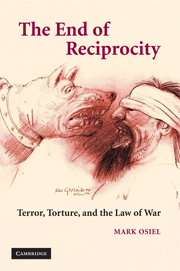Crossref Citations
This Book has been
cited by the following publications. This list is generated based on data provided by Crossref.
2009.
Recent acquisitions of the Library & Research Service, ICRC.
International Review of the Red Cross,
Vol. 91,
Issue. 875,
p.
643.
Anderson, Kenneth
2009.
Targeted Killing in U.S. Counterterrorism Strategy and Law.
SSRN Electronic Journal,
Strawser, Bradley Jay
2010.
Handbook of Unmanned Aerial Vehicles.
p.
2943.
Strawser, Bradley Jay
2010.
Moral Predators: The Duty to Employ Uninhabited Aerial Vehicles.
Journal of Military Ethics,
Vol. 9,
Issue. 4,
p.
342.
Miller, Seumas
2011.
The Encyclopedia of War.
2011.
The Politics of Prisoner Abuse.
p.
162.
2011.
The Politics of Prisoner Abuse.
p.
1.
2011.
The 9/11 Effect.
p.
161.
Devin, Guillaume
and
Smouts, Marie-Claude
2011.
Les organisations internationales.
p.
231.
Penny, Christopher K.
2011.
Obeying Restraints: Applying the Plea of Superior Orders to Military Defendants before the International Criminal Court.
Canadian Yearbook of international Law/Annuaire canadien de droit international,
Vol. 48,
Issue. ,
p.
3.
2011.
The Politics of Prisoner Abuse.
p.
192.
Plaw, Avery
and
Fricker, Matthew S.
2012.
Tracking the Predators: Evaluating the US Drone Campaign in Pakistan.
International Studies Perspectives,
Vol. 13,
Issue. 4,
p.
344.
van Verseveld, Annemieke
2012.
Mistake of Law.
p.
133.
Cohen, Madeline E.
2012.
International Humanitarian Law of Armed Conflict: A Critical Annotated Bibliography for Collection Development.
International Journal of Legal Information,
Vol. 40,
Issue. 3,
p.
393.
2012.
Human Rights in International Relations.
p.
71.
Stephen, Christopher
2012.
INTERNATIONAL CRIMINAL LAW: WIELDING THE SWORD OF UNIVERSAL CRIMINAL JUSTICE?.
International and Comparative Law Quarterly,
Vol. 61,
Issue. 1,
p.
55.
Liivoja, Rain
2013.
Normative Pluralism and International Law.
p.
143.
2014.
Law, Science, Liberalism and the American Way of Warfare.
p.
120.
Miller, Seumas
2014.
Mark Osiel: The End of Reciprocity: Terror, Torture and the Law of War.
Criminal Law and Philosophy,
Vol. 8,
Issue. 3,
p.
659.
Kalmanovitz, Pablo
2015.
Aggression and the symmetrical application of International Humanitarian Law.
International Theory,
Vol. 7,
Issue. 1,
p.
1.



